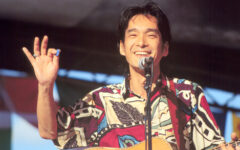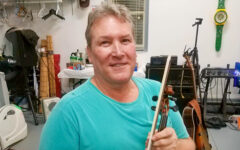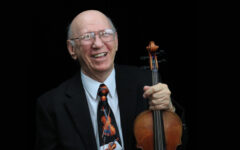
Eric Weissberg, banjo player, multi-instrumentalist, and singer passed away on March 22, (2020) in a nursing home near Detroit, Michigan, aged 80. He had been suffering from Alzheimer’s Disease for many years.
Born in New York City on August 16, 1939, Weissberg’s main claim to fame was his melodic banjo arrangement and performance with guitarist, the late Steve Mandel, on the recording of the Arthur “Guitar Boogie” Smith tune Dueling Banjos used in the hit movie Deliverance.
Influenced initially by Pete Seeger, he began performing as a 10-year-old on Radio Station WNYC. Later he graduated from The High School of Music & Art in New York City, and went on to the prestigious Juilliard School of Music, where he performed classical music with the Westchester Symphony Orchestra.
From the age of 17 he frequented the Washington Square Park playing banjo and fiddle with John Herald and Bob Yellin. Later the trio formed the Greenbriar Boys, but he left the group before they made their first recordings.
In 1957, Weissberg appeared on the seminal Folkways album American Banjo Scruggs Style, and on the influential Elektra album, Folk Banjo Styles, released four years later.
Two tears later Weissberg joined the folk group, The Tarriers, initially playing bass although he was soon contributing on banjo, fiddle, guitar, mandolin, and vocals. While he was with them, they recorded several landmark LPs.
When he entered a banjo contest in Warrenton, Virginia, he had his first contact with what he called “real” bluegrass music.
Weissberg’s 1963 Elektra recording New Dimensions in Banjo and Bluegrass influenced Tony Trischka, Pete Wernick, and Steve Martin, to mention just three banjo players.
By the Spring of 1969, Weissberg was a top session musician in New York City, and about that time he joined Jim Rooney and Bill Keith, with whom Weissberg had become friends in the early 1960s, in an ad-hoc group, engaging fiddler Richard Greene along the way, to play at Washington Square Church. This led to them to getting a contract with Warner Brothers and recording an album in a Country-Rock style as The Blue Velvet Band.
A later version of the New Blue Velvet Band toured extensively, appearing at major folk festivals in the north-eastern states, in Canada and in various parts of Europe.
Then came the film Deliverance and Dueling Banjos. The soundtrack was released around the world, and the single became an enormous hit, being played on Top 40, AOR and Country music stations alike. It reached #2 on the Billboard singles charts, staying there for five weeks, topped the Cashbox pop charts, and peaked at #2 in Canada.
It was certified as a gold record by the Recording Industry Association of America (RIAA).
This TV performance of Dueling Banjos is from the late-night musical variety series, The Midnight Special …….
The recording won a Grammy award for the Best Country Instrumental Performance in 1973.
The soundtrack LP, Dueling Banjos: From the Original Motion Picture Soundtrack ‘Deliverance’, was even more successful, topping charts in USA as well as in Canada, as well as reaching Gold Record status.
As a session musician, Weissberg played on albums by Judy Collins (Fifth Album and Pack Up Your Sorrows); the Clancy Brothers; Doc and Merle Watson (Ballads From Deep Gap); Melanie; Billy Joel (Piano Man); Frankie Valli; Bob Dylan (Blood on the Tracks); Loudon Wainwright III; Talking Heads (Little Creatures); Tom Paxton, Jim Croce, Art Garfunkel, John Denver (Take Me Home, Country Roads), Ronnie Gilbert; jazz musicians Herbie Mann and Bob James; and Nanci Griffith (Other Voices Too); among others.
He toured with top artists like Judy Collins, Tom Paxton, John Denver, and Art Garfunkel.
The choral arranger Robert DeCormier used Weissberg to perform some of his most difficult pieces live.
In February 2009 Weissberg performed at the Riverside Church in New York City with the Aaron Copland School of Music at Queens College orchestra and chorus, along with the Riverside Inspirational Choir and NYC Labor Choir, to honor President Abraham Lincoln’s 200th birthday. Directed by Maurice Peress, they performed Earl Robinson’s The Lonesome Train: A Music Legend for Actors, Folk Singers, Choirs, and Orchestra, in which Weissberg played solo banjo.
Weissberg continued to tour and perform at folk festivals until health problems curtailed his activities.







